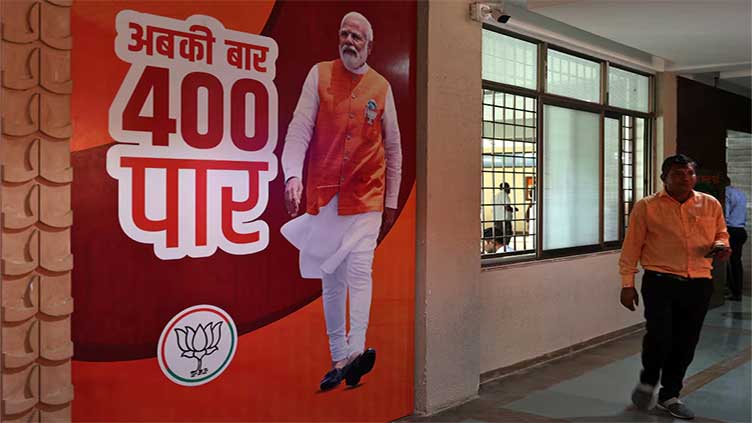India vote count shows Modi alliance heading to majority but no landslide

World
Modi's own BJP was falling short of a majority of its own in the 543-member parliament
NEW DELHI (Reuters) – Indian Prime Minister Narendra Modi's alliance was winning a majority of seats about halfway through the count in the general election on Tuesday, but the numbers were well short of the landslide predicted in exit polls, TV channels said.
Modi's own Bharatiya Janata Party (BJP) was falling short of a majority of its own in the 543-member parliament, the trends showed. Having to depend on allies to form the government could introduce some uncertainty in policy-making as Modi has ruled with an authoritative hold in the last decade.
The Hindu nationalist BJP won a majority of its own when it swept to power in 2014, ending India's era of unstable coalition governments, and repeated the feat in 2019.
The prospect of Modi having to rely on allies spooked markets with stocks falling steeply. The blue-chip NIFTY 50 was down 4.8% and the S&P BSE Sensex was down 4.7% at 0833 GMT.
The rupee also fell sharply against the dollar and benchmark bond yields were up.
"A narrower-than-expected victory for Modi's alliance may raise doubts about the new government's ability to push through politically difficult reforms seen as crucial to sustain India's economic growth, which is already the world's fastest," said Vasu Menon, managing director of investment strategy at OCBC in Singapore.
"Despite this, the fact remains that the BJP-led alliance is still set to win a third term, which means continuity in the government's infrastructure and manufacturing-led drive to boost economic growth."
Markets had soared on Monday after exit polls on June 1 projected Modi and BJP would register a big victory, and the ruling National Democratic Alliance (NDA) was seen getting a two-thirds majority and more.

At 0900 GMT, TV channels showed the NDA was ahead in nearly 300 of the 543 elective seats in parliament, where 272 is a simple majority, with about half the votes counted.
Full results are likely in several hours.
They showed BJP accounted for under 250 of the seats in which the NDA was leading, compared to the 303 it won in 2019.
The opposition INDIA alliance led by Rahul Gandhi's centrist Congress party was leading in over 220 seats, higher than expected.
Congress alone was leading in nearly 100 seats, almost double the 52 it won in 2019 – a surprise jump that is expected to boost Gandhi's standing.
However, politicians and analysts said it was too early to get a firm idea of the voting trends since counting still had some way to go.

"It's a fair assessment to say 400 at the moment certainly looks distant," BJP spokesperson Nalin Kohli told the India Today TV channel, referring to some projections that gave over 400 seats to the NDA.
"But we need to wait...to have a final picture of the seats because the exit polls speak of a massive sweep, (and) the counting trends currently don't seem to match that," he said.
"The BJP-NDA will form the government, that trend is very clear from the start," he added.
POLICY SLOWDOWN
TV exit polls broadcast after voting ended on June 1 projected a big win for Modi, but exit polls have often got election outcomes wrong in India. Nearly one billion people were registered to vote, of which 642 million turned out.
However, if Modi's victory is confirmed even by a slim margin, his BJP and its allies will have triumphed in a vitriolic campaign in which parties accused each other of religious bias and of posing a threat to sections of the population.

Investors had cheered the prospects of another Modi term, expecting it to deliver further years of strong economic growth and pro-business reforms, while the anticipated two-thirds majority in parliament would allow major changes to the constitution.
"The biggest disappointment for the market is the fact that BJP does not have a majority (yet)...that opens up a Pandora's box because all the other players...are all quite volatile," said Dipan Mehta, founder director at Elixir Equities in Mumbai.
Bank of Baroda economist Sonal Badhan said the lack of a majority for BJP on its own could mean "some slowdown in policy decisions can be expected".
The seven-phase, seven-week poll that began on April 19 was held in searing summer heat with temperatures touching nearly 50° Celsius (122° Fahrenheit) in some parts.
More than 66% of registered voters turned out, just one percentage point lower than the previous election in 2019, squashing pre-poll concerns that voters might shun a contest thought to be a foregone conclusion in Modi's favour.
Modi, 73, who first swept to power in 2014 by promising growth and change, is seeking to be only the second prime minister after India's independence leader Jawaharlal Nehru to win three straight terms.



